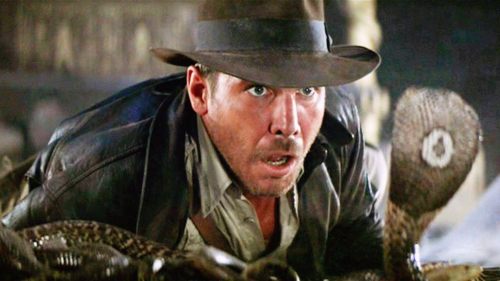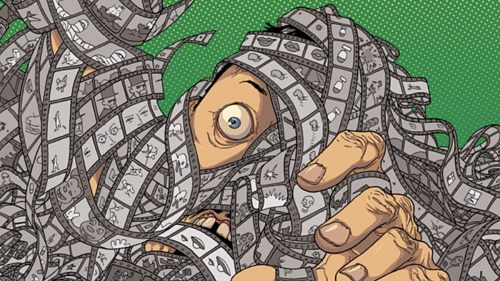HALO’s Long Crawl Towards A Decent Live-Action Adaptation
Halo has been trying to make it to non-interactive screens for nearly as long as it has existed. It’s been struggling just as long. Showtime greenlit a ten-episode Halo drama to series back in June - the closest it’s come to fruition - but now even that is facing difficulties.
Just this month, Rise of the Planet of the Apes director Rupert Wyatt exited the project, citing scheduling conflicts (despite having no other project publicly lined up, other than the presumably already-completed sci-fi thriller Captive State, recently rescheduled from August 2018 to March 2019). Those conflicts were created by extensions to the Halo schedule, but they’re far from the first time the project has seen such delays.
The first attempt at making a Halo screen adaptation came from noted video game fan Peter Jackson, who spent years developing a feature with writers Alex Garland (Annihilation) and D.B. Weiss (Game of Thrones). That film, confirmed in 2004 and originally slated for 2008, would have been directed by then-unknown Neill Blomkamp, whose skill with visual effects primed him for such an effects-heavy project. That project fell through, with Universal and Fox pulling their support in 2006. The props and vehicles built by Weta Workshop were used in a 2007 live-action Halo 3 promo called Halo: Landfall, and Jackson and Blomkamp later teamed up for District 9, but no Halo movie eventuated. In fact, Blomkamp said in 2009 that if offered it again, he’d say no.
The years following the Jackson project’s dissolution saw a number of false starts for big-budget Halo adaptations. Collateral and Pirates of the Caribbean writer Stuart Beattie reportedly wrote spec scripts for a movie trilogy, beginning with the popular Fall of Reach story. Steven Spielberg was said to be interested, with Dreamworks pushing for the rights to the IP. Little official word emerged, however, until 2013, at which point Microsoft announced a television series to be executive-produced by Spielberg alongside the Xbox Entertainment Studios production house. The reveal came directly alongside that of the Xbox One, and was meant to be a major step toward Xbox Live’s goal of multimedia domination. Even Blomkamp changed his tune, saying he'd be keen to get involved.
Xbox Entertainment Studios subsequently shut down a year later. The project, however, survived, reverting to Showtime, Microsoft’s 343 Industries, and Amblin Television. One cycle of directorial hiring and resignation later, here we are.
None of this is to say that Halo hasn’t been adapted to screen already - just that it hasn’t been done particularly well yet. The two live-action webseries released to date, Forward Unto Dawn and Nightfall, both suffer from a lack of compelling characters or storylines to follow, and an insufficient budget to offset that issue with compelling action or visuals. The animated shorts anthology Halo Legends had more misses than hits, and it never matched the highs reached by fellow animated anthologies The Animatrix or Batman: Gotham Knight. Animated miniseries Fall of Reach had the best shot at making an impact, but its budget, too, worked against it, resulting in undercooked animation.
Is it even possible to make a good adaptation of Halo? Certainly, the universe Bungie created for the series has enough going on in it. There are several games’ worth of material to draw on, with a lengthy backstory and some legitimately cool sci-fi ideas. There’s been a plethora of books and comics published, and though I haven’t read any of them, I’m assured at least some of them are worthwhile - the Fall of Reach novel especially has a strong reputation.
Despite all this, a dramatic adaptation has still proven elusive, in part due to fundamental roadblocks. The series’ most recognisable character, Master Chief, never takes his helmet off - not necessarily an issue in and of itself, but aside from some self-aware jokes, he’s also got about as much personality as you’d expect from someone who never takes his helmet off. That’s closely linked to the biggest dramatic issue with the franchise: its focus almost exclusively on military combat, which is fine for video games but lacks the depth to fuel a passively experienced narrative. Large-scale interplanetary warfare and heroic military sacrifice require more underpinning them to make for a satisfying story. Then, of course, there’s the fact that Halo was inspired heavily by the likes of Aliens and Starship Troopers. We’ve seen futuristic colonial marines fighting parasitic extraterrestrials before, and any attempt to do that in the film/television medium will surely suffer by comparison.
And oh, yeah, one of the biggest non-Master Chief characters, helpful AI Cortana, is now a real-life Microsoft product. There's no way that's not going to be weird.
With over $5 billion in game sales to back it up, a big-budget Halo adaptation is inevitable; Wyatt’s exit from the Showtime series will likely be little more than a speed bump in the long run. The network says the show is its “most ambitious series ever,” while president of programming Gary Levine says it’s progressing with “rich characters, compelling stories, and powerful scripts.” Production value is intended to rival that of Game of Thrones. So we’re going to get this series. Hopefully, all that big talk gets backed up by big results.
In the meantime, you know what other Bungie sci-fi game has, against all odds, assembled a compelling stockpile of characters and side stories, and would support a show with a more varied tone than Halo? Destiny. It’s just a shame it’s not the megahit its progenitor is. Shaaaame.



